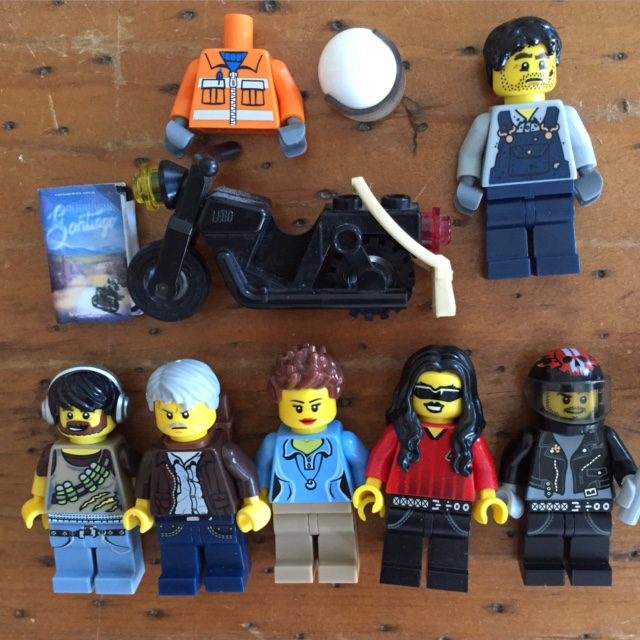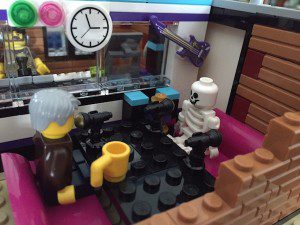Killing Your Darlings, and Bringing Them Back to Life
My bonus content for the recent Young Adult Scavenger Hunt was a deleted scene from Surviving Santiago. It happened to be a scene I especially loved, in large part because my daughter, who was 16 at the time, wrote it with me.
The early drafts of Surviving Santiago contained eight tapes recorded during the time the story takes place and discovered near the end. Reading transcripts of the tapes allowed readers to know things that my protagonist, Tina, did not know and thus contributed dramatic irony to the story. (Dramatic irony occurs when the reader knows something that characters do not, and wonder when the characters will find out and what will happen when they do.) My editor felt that readers should be as shocked as Tina when events unfold as they do. The emotional impact is different, and so far, most of the reviewers and commentators have liked the choice my editor and I eventually made.
“Kill your darlings” is common advice for the revision process. We fall in love with aspects of our writing or story: a beautiful turn of phrase that is also out of place, a character who offers nothing except one-liners, a scene with a well-drawn setting or lively goings-on that fails to move the story forward, a gratuitous death or one that is improperly mourned. In the past, I’ve made major changes reluctantly — for instance, it took three months of an editor’s lobbying for me to change a major element of Rogue‘s ending — but with Surviving Santiago, I made the change quickly. Although I did feel dramatic irony contributed to the reading experience — as it did in Gringolandia when Daniel’s girlfriend Courtney learns something about his father that she won’t tell Daniel — the tapes also disrupted the flow of the narrative. Imagine the protagonist’s narrative voice established and then “BOOM!” — something completely different. It took the reader out of the story.
For fans of dramatic irony — and those who get to the end of the novel and wonder what was really on those tapes — I offered to put parts of them on my website. Hence my participation in the YA Scavenger Hunt. But the content was only available for a short period of time, so I’ve resurrected the tape that my daughter helped me write.

Characters from Surviving Santiago in LEGO. From bottom left, Ernesto, Papá, Tía Ileana, Tina, Frankie. Frankie’s father is in the top row along with Frankie’s motorcycle and delivery uniform.
Tape Five, Monday 3 July 1989
El Capo/Romeo
El Capo: Good evening, Romeo. How is your plan coming along?
Romeo: Good news and bad news, sir.
El Capo: Start with the good news. I like good news.
Romeo: This flyer. The target is speaking at a demonstration.
El Capo: No. Too many witnesses.
Romeo: The demonstration’s illegal.
El Capo: So what? Nobody bothers with illegal demonstrations these days.
Romeo: Can’t we get some friendly carabineros to bust it up?
El Capo: Don’t be stupid. We need hard evidence, like an incitement to riot. Pick up something off his desk, something he’s written.
Romeo: That’s going to be tough. The girl…you see…uh…
El Capo: What happened?
Romeo: Well, she broke up with me.
El Capo: Imbecile! Why?
Romeo: I took her on my deliveries—
El Capo: And why would you bring her with you?
Romeo: She asked me. She sits at home all day with nothing to do because the target’s always working. And I didn’t have the marijuana for her. I thought she’d lose trust in me because I didn’t come through for her in her hour of need.
[INHALING SOUND, LAUGHTER]
Romeo: It’s not funny, sir. I had to show I cared about her.
El Capo: You do not bow to whatever ridiculous request the girl has.
Romeo: I thought she could help me too. What she calls a “win-win.”
El Capo: Gringo nonsense. Go on.
Romeo: I asked her to watch my motorcycle so I wouldn’t get a ticket. But I ran into an old friend who works in one of the office buildings. Señorita Aguilar got jealous.
El Capo: This is worse than I thought. Don’t get your friends from your neighborhood involved in our mission.
Romeo: I told her it was nothing, but she wouldn’t listen.
El Capo: The other girl. Was she the one I caught you with last year?
Romeo: Yes, Sofia. It was the first time I’d seen her since. I swear. She’s not my type anymore.
El Capo: And who is your type these days?
Romeo: Uh, someone with more brains. Likes the same stuff I do. Seen the world. And a little less, uh, used up.
El Capo: So you’ve become a real romantic.
Romeo: I guess I’m looking for something different.
El Capo: You can go girlfriend shopping when your mission is finished. Your job now is to get Señorita Aguilar back. You need to find out what the target’s going to say at that demonstration.
Romeo: I can’t even talk to her on the phone.
El Capo: You called the house?
Romeo: I wrote down the number one day when I was there.
El Capo: So you can tip them off? How many times did you call? And who answered?
Romeo: Uh…five…maybe six times. The housekeeper answered twice. A man, I think the target, once. As soon as someone answered, I hung up.
El Capo: So now he’s going to put a trace on his phone.
Romeo: I called from pay phones. Different ones each time.
El Capo: Then you’re not as stupid as I thought.
Romeo: I’ll keep trying, sir.
El Capo: Good…And one other thing.
Romeo: Yes.
El Capo: How many ex-girlfriends do you have, Romeo? I don’t want this happening again.
Romeo: Besides Sofia, three others. Maybe you should let me bring Señorita Aguilar here. So we don’t have to go out in public.
El Capo: And why did I not want you here with the other girl?
Romeo: We keep everything in the office. And the door locked.
El Capo: Hmm… You might be on to something…All right. [CLINK] Here’s a key to the apartment. I’ll leave the contraband you requested under the sink, behind the powdered cleaner. Don’t mix them up.
Romeo: I won’t.
El Capo: Yes, you might. So listen. The contraband is in a baggie. The powdered cleaner is in, you know, the cardboard cylinder labeled “powdered cleaner.”
Romeo: Got it. May I have some videos and the Nintendo, too?
El Capo: I thought you’d have other plans for her.
Romeo: She’s a little…uh…young for me. And more into movies and video games and stuff.
El Capo: Fine. The sooner you carry out your mission the sooner you’re rid of her for good.








It’s so hard, isn’t it? We spend so much time writing scenes only to cut them. I spent weeks on a scene, rewriting it several time. Then I cut the thing.
I’m glad your “darling” scene has been revived. 🙂
I know! It seems like so much wasted effort. But you never know when a scene or a phrase will show up, in one form or another, in a different book.